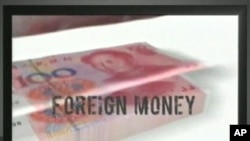This US election season, money in the form of campaign contributions appears to be playing a greater role than ever. A Supreme Court decision earlier this year opened the way for more campaign spending on TV commercials by corporations and labor unions. By the time the election is held on November 2, somewhere between $2 to $3 billion will have been spent on this year's races for the House, the Senate, and state governors, according to groups that monitor fundraising.
In addition to campaign speeches, candidate debates and even the occasional scuffle involving angry voters, endless TV ads have become a driving force in this year's congressional campaign.
One of the most intense Senate races is taking place in Nevada between Democratic Senate leader Harry Reid and Republican challenger, Sharron Angle.
REID AD: "She says rape victims should be forced to have the baby."
ANGLE AD: "Harry Reid. The best friend illegals have ever had."
Many of the ads are funded by groups unaffiliated with political parties, many with anonymous donors, and they're having an impact on the campaign.
Republicans seem to be benefiting from the enhanced flow of money thanks to a Supreme Court ruling in January lifting restrictions on corporate and union spending on campaign ads. It's caught the attention of President Barack Obama, who raised questions about fundraising by the U.S. Chamber of Commerce at a campaign event in Illinois.
"Are you going to let special interests from Wall Street and Washington and maybe places beyond our shores come to this state and tell us who our senator should be?" asked Obama.
The Chamber denies it is using foreign money, and Republicans are firing back, including Karl Rove, a political adviser to former President George W. Bush. Rove is involved with a group raising money to help Republican candidates.
"This is a desperate political ploy by the White House to distract attention from the failed economic policies," said Rove.
Election campaigns in the U.S. are expensive and getting more so, says expert Susan Tolchin.
"It costs a great deal more to run for office than it ever did. Television advertising is very costly," said Tolchin.
Fewer restrictions on campaign fundraising and spending are helping the Republicans this year, says historian Allan Lichtman.
"Because of the change in the Supreme Court's interpretation of the laws, wealthy donors can pour huge amounts of money into the campaigns without disclosing who they are," said Lichtman. "So the Republicans are getting the best of both worlds. They have the grass roots energy, which the Democrats lack, from the Tea Party and they have got the big money."
But Michelle Bernard of the Independent Women's Forum says money is flowing to Republicans because voters prefer their message of smaller government and want to send President Obama a message.
"Whether people are Democrats or Republicans, and they are complaining about the amount of money that is funded to candidates through outside groups, the money is following the candidate," said Bernard. "It is not the other way around."
Democrats have tried to focus attention on Republican campaign contributions as a major issue, but so far the polls show voters are most worried about the economy and jobs.





